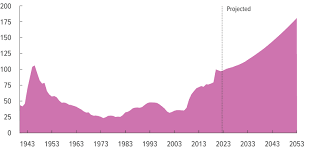Nov. 24, 2024 –When the US election was called for Donald Trump the night of November 5, the stock market rose but the bond market fell. The yield on 10-year US government bonds increased from 4.3 % to 4.4%, where it remained 10 days later. The long-term rate had been below 4.0 % in September. The combination – stock market up but bond market down – strongly suggests that the news of Trump’s victory was seen as implying higher government budget deficit and debt numbers in the future.

